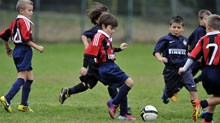Your Child Today: 2 to 3 years
Our neighborhood playground is a popular hangout for the 3-and-under set and, until recently, my son was a welcome addition.
Unfortunately, his attitude about what is "his" gradually extended to most of the playground equipment. He began to hit, yell at and boss the other small fries with very little provocation. More often than not, our visit would end in tearful screams as I grimly dragged him home.
Time-outs, threats and early nap times didn't work. What am I doing wrong? I'd ask myself. Other parents surely don't have this problem with aggression, do they?
They do. Kids 2 to 3 years old are notoriously physical and territorial in their reactions. According to child expert Penelope Leach, children aren't ready for cooperative play until well into the third year.
At this developmental stage, a child's behavior with other children tends to be guided simply by instinct and trial and error. His reactions are based on impulse alone because he has not yet developed the internal controls necessary for getting along with others. That being the case, how can parents regulate behavior in public? Here are some guidelines that can help:
Always bring a toy. This prevents battles with other children who may also have brought something to the park.
Avoid going to the playground during "high traffic" times of day. A group of children often stimulate a high-energy child to react more aggressively. If this seems to be the case with your child, try to go to the park when it's not so crowded.
Limit your warnings. Avoid saying things like, "If you do that one more time, we'll go home," unless you mean it and are ready to follow through. Or try another tactic. Take your child to the car or someplace away from other children and speak firmly to her. A separation from the action is often all that's needed to curb unwanted behavior.
Pray together before leaving the house. My son loves to pray before meals and bed, and despite his youth, the prayers calm him down. Starting an outing in a quiet mode can prolong an obedient spirit.
Time your day well. One of the toughest parts about a trip to the park is coming home. If you anticipate resistance when it's time to leave, plan for incentives. Don't serve dessert immediately after supper; go to the park instead. When it's time to return home, remind your child she has ice cream waiting at home. This isn't a bribe since you were going to serve ice cream for dessert anyway. It's a matter of timing events with the best results.
These five guidelines can make a world of difference. As for my son, he's still rambunctious and willful. But I have modified my plans to best fit his personality and our conflicts have decreased considerably. The park, once again, is one of our favorite places to be.
?Melodie Wright
Freelance writer and mother
We'd really like to know what you think about this article!
Is this the kind of article you'd like to see more of?
Is there a topic you'd like us to cover?
Please send your suggestions tocpt@christianparenting.net
1999 by the author or Christianity Today/Christian Parenting Today Magazine.
Click here for reprint information on Christian Parenting Today.
Read more articles that highlight writing by Christian women at ChristianityToday.com/Women
 Read These Next
Read These Next

 A Saner SummerTake the crazy out of these lazy, hazy days
A Saner SummerTake the crazy out of these lazy, hazy days

 The Work-Life-Faith BalanceFollowing God’s lead through all seasons of life
The Work-Life-Faith BalanceFollowing God’s lead through all seasons of life








 Homepage
Homepage